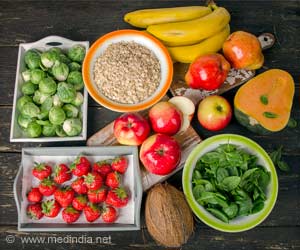- One of the rising public health concerns is type 2 diabetes that affects 451 million worldwide, with increased risk among 374 million people
- Having at least two serves of fruit per day has been linked to 36% reduced chances of developing type 2 diabetes
- Whole fruits have a lower glycemic index that serves in improving blood sugar levels and boosts insulin sensitivity when compared to fruit juice
"We found an association between fruit intake and markers of insulin sensitivity, suggesting that people who consumed more fruit had to produce less insulin to lower their blood glucose levels. This is important because high levels of circulating insulin (hyperinsulinemia) can damage blood vessels and are related not only to diabetes, but also to high blood pressure, obesity, and heart disease. A healthy diet and lifestyle, which includes the consumption of whole fruits, is a great strategy to lower your risk of developing type 2 diabetes,"says Dr Nicola Bondonno from ECU's Institute for Nutrition Research and lead author of the study.
Read More..
What is Type 2 Diabetes?
Diabetes is a metabolic disease that is characterized by high blood glucose (blood sugar). Type 2 diabetes occurs when your body doesn’t sufficiently produce/utilize a hormone made by the pancreas called insulin (which allows glucose from food to get into your body cells for energy).The glycated haemoglobin (A1C – measures average blood sugar level for the past two to three months) test is a commonly preferred method to diagnose type 2 diabetes. There are many undetected type 2 diabetes cases that expose them to an increased risk for several serious conditions, such as cardiovascular disease (which may result in heart attacks and strokes).
Freshness is the Key
The study team analyzed data from 7,675 Australians participating in the Baker Heart and Diabetes Institute's AusDiab Study to evaluate the prevalence of diabetes after five years among those who consumed fruit and fruit juice.It was seen that people who consumed whole fruit had higher insulin sensitivity and a lower risk of diabetes when compared to those who had fruit juice intake. Thus, the fruit benefits out served that of fruit juice, most probably because fruit juices are much higher in sugar and lower in fiber. However, the author states that the exact reason for higher insulin sensitivity offered by the fruits remains unclear and could be multifaceted.
Since fruits are a storehouse of vitamins, minerals, phytochemicals (may increase insulin sensitivity), and fiber along with a lower glycemic index, they serve in controlling the slow release of sugar into the blood and rendering a sense of fullness for a greater time.
Health Benefits of Fruits
Fruits are deemed as “health promoters” with numerous benefits:- Regulate the functioning of the digestive system and prevent irritable bowel syndrome
- Lower the risk of heart disease and stroke
- Reduce high blood pressure (hypertension)
- Prevent eye diseases like cataracts and macular degeneration
- Protect against various diseases like cancer
- Help in losing weight
Managing Type 2 Diabetes
The following methods may aid in managing blood sugar levels and also delay/prevent complications apart from consuming a healthy diet rich in fibers and vegetables- Practice regular exercise and physical activity
- Losing weight toils as an additional benefit against type 2 diabetes
- Have regular diabetes medication or insulin therapy
- Watch your blood sugar periodically
- Seek your doctor for any queries
References:
- Associations Between Fruit Intake and Risk of Diabetes in the AusDiab Cohort: Nicola P Bondonno et al: https://doi.org/10.1210/clinem/dgab335: The Journal of Clinical Endocrinology & Metabolism 2021.
- National Diabetes Statistics Report, 2020 - (https://www.cdc.gov/diabetes/data/statistics-report/index.html)
- What is Diabetes? - (https://www.niddk.nih.gov/health-information/diabetes/overview/what-is-diabetes)
- Vegetables and Fruits - (https://www.hsph.harvard.edu/nutritionsource/what-should-you-eat/vegetables-and-fruits/)
- Health Benefits of Fruits and Vegetables - (https://www.ncbi.nlm.nih.gov/pmc/articles/PMC3649719/)
Source-Medindia
















